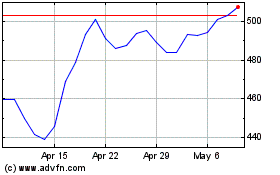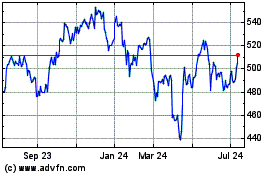By Anna Wilde Mathews
UnitedHealth Group Inc. Chief Executive Officer David Wichmann
retired from the health-care giant after 40 months in the role, an
abrupt move that came as a surprise to company executives and
investors.
Mr. Wichmann was succeeded by Andrew Witty, the company's
president. Mr. Witty, the 56-year-old former CEO of the drugmaker
GlaxoSmithKline PLC, became the chief executive of UnitedHealth's
Optum health-services unit in 2018 and added the title of president
of the company in November 2019. He recently returned from a leave
of absence to work on Covid-19 efforts at the World Health
Organization.
Mr. Wichmann, 59, who became CEO in September 2017, will work in
a transition role through March of this year. He joined
UnitedHealth in 1998 and had been president before assuming the
chief executive role.
UnitedHealth, based in Minnetonka, Minn., is the parent of the
biggest U.S. health insurer, with 2020 revenue topping $250
billion. In addition to its insurance business, the company
includes Optum, which includes data analysis, a pharmacy-benefit
manager and a sprawling network of doctor groups and surgery
centers.
The shift came after Mr. Witty signaled to the board that he was
considering leaving, according to people with knowledge of the
matter. Mr. Witty, who served on the UnitedHealth board before
joining the company as an executive, is well-regarded by the board,
which didn't want to lose him, according to these people.
Mr. Wichmann stepped down voluntarily, these people said.
"With Dave's retirement, the board saw Andrew as the outstanding
choice, " said a UnitedHealth spokesman.
The experience of living through the pandemic had underscored to
Mr. Wichmann the importance of time with family, the spokesman
said, and he decided to leave at a moment when the company was
doing well. The spokesman said Mr. Wichmann and Mr. Witty declined
to comment.
In a note sent Thursday morning to UnitedHealth employees, Mr.
Wichmann said it was bittersweet to announce his departure. He
wrote that the move "is the right decision for me and my family."
Mr. Wichmann was in the office Thursday, according to people with
knowledge of the matter.
The sudden switch is particularly unexpected in a company that
has demonstrated a deliberative leadership transition process at
the top. UnitedHealth's shares went up more than 60% during Mr.
Wichmann's tenure, and he has been well-regarded by investors.
Internally, the move was seen as surprising, according to people
with knowledge of the matter. Last week Mr. Wichmann led an annual
meeting of the company's top leaders, with hundreds of executives
gathering virtually. During one session, Mr. Wichmann, speaking
about leadership and the need to strive for improvement, made a
reference to himself getting feedback that he found challenging,
these people said.
But the people said there was no sign that Mr. Wichmann was
planning an exit, as he spoke optimistically about the company's
future direction.
Mr. Wichmann, a former chief financial officer of the company,
had long been positioned as the successor to Stephen J. Hemsley,
now UnitedHealth's board chairman, who was the company's CEO for
more than a decade. Mr. Wichmann had been seen as close to Mr.
Hemsley.
Indeed, before joining UnitedHealth in 1998, Mr. Wichmann was a
partner at Arthur Andersen, and Mr. Hemsley came to UnitedHealth a
year earlier from the same firm.
The move came within weeks of the release of earnings that were
seen as solid, and UnitedHealth's shares were down 2.5% on
Thursday. UnitedHealth said it wasn't changing its earnings
guidance for 2021 or its long-term financial growth targets.
"Everything looks on track" with the company's performance, said
Matthew Borsch, an analyst at BMO Capital Markets. Investors "will
look to better understand what the catalyst was for the change,
until they understand that the reaction will be negative on the
uncertainty," he said.
During his time at the helm, Mr. Wichmann made no major changes
to the direction of the company. He continued to bulk up its Optum
unit through acquisitions of health-care providers and, most
recently, announced that UnitedHealth would acquire Change
Healthcare Inc., a health-technology company. During the pandemic,
he had highlighted efforts to support UnitedHealth clients,
health-care providers and others.
The company said Dirk McMahon will become president and chief
operating officer and will join Mr. Witty and Chief Financial
Officer John Rex in the chief executive office.
In his own note to employees, Mr. Witty said his top priorities
were "to help ensure we continue to modernize the health system;
continue developing and attracting the best talent in our industry;
innovate and accelerate our capabilities; and set forth a bold
strategy for transforming the way care is accessed, delivered and
paid for across the continuum."
Mr. Hemsley praised both Mr. Witty and Mr. Wichmann in a press
release, saying Mr. Witty is "uniquely well-positioned to help the
company take the next steps on its steady path to grow and deliver
for its shareholders and the customers and people we are privileged
to serve."
He said Mr. Wichmann was "an outstanding leader, and the Board
and I are deeply appreciative of his contributions to the company's
continued success." He said Mr. Wichmann "will serve as a model of
servant leadership for years to come."
Write to Anna Wilde Mathews at anna.mathews@wsj.com
(END) Dow Jones Newswires
February 04, 2021 20:59 ET (01:59 GMT)
Copyright (c) 2021 Dow Jones & Company, Inc.
UnitedHealth (NYSE:UNH)
Historical Stock Chart
From Mar 2024 to Apr 2024

UnitedHealth (NYSE:UNH)
Historical Stock Chart
From Apr 2023 to Apr 2024
